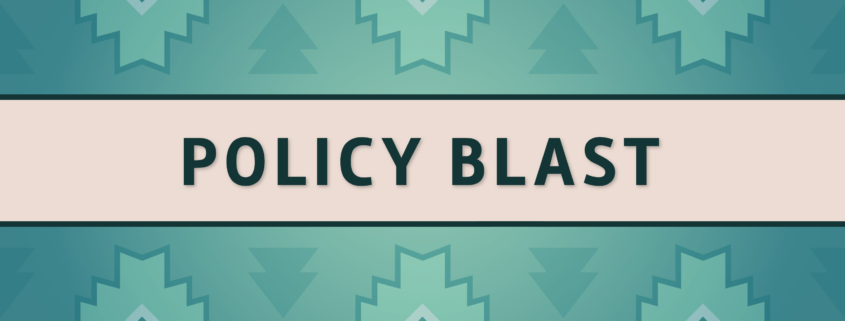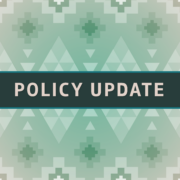House Advances Reconciliation Bill with Exemptions for American Indian and Alaska Native People from Community Engagement Requirements
On May 22, 2025, the House of Representatives voted 215-214-1 to pass a major reconciliation bill that would deliver the major elements of President Trump’s legislative agenda, including tax cuts, Medicaid reforms, and lifting the debt ceiling. The bill contains a health title, which includes Medicaid reform provisions, such as cost-sharing and provider tax changes. Importantly, the bill exempts American Indian and Alaska Native beneficiaries from the Medicaid community engagement requirements.
NCUIH Action
The National Council of Urban Indian Health (NCUIH) has worked with Urban Indian Organization (UIO) leaders and national partners, including the National Indian Health Board (NIHB) and the Medicaid Medicare Policy Committee (MMPC), to ensure that American Indian and Alaska Native Medicaid beneficiaries are protected from harmful policy changes. NCUIH participated in over 60 meetings with congressional offices.
Next Steps
The reconciliation package now goes to the Senate for consideration.
Analysis
Community Engagement Requirements for Certain Medicaid Beneficiaries
What it Does: States would be required to implement community engagement requirements for able-bodied adults without dependents. Compliance may be achieved through:
- Working, volunteering, or participating in a work program for at least 80 hours/month; or
- Enrolling in educational programs totaling 80 hours/month.
Impact on Indian Country: The bill exempts American Indian and Alaska Native beneficiaries from these requirements. Specifically, it states that “specified excluded individuals” include:
- Indians and Urban Indians as defined in the Indian Health Care Improvement Act (IHCIA);
- California Indians as described in Section 809(a) of the IHCIA;
- Individuals determined eligible as an Indian for the Indian Health Service under regulations promulgated by the Secretary.
The work requirements go into effect on December 31, 2026.
Modifying Cost Sharing Requirements for Certain Expansion Individuals Under the Medicaid Program
What it Does: Requires states to impose cost sharing on Medicaid Expansion adults with incomes over 100 percent of the federal poverty level (FPL). This cost-sharing is capped at:
- $35 per service.
- May not exceed five percent of the individual’s income.
Impact on Indian Country: American Indian and Alaska Native beneficiaries are already exempted from cost-sharing provisions for those who receive a “service directly by the Indian Health Service, an Indian Tribe, Tribal Organization, or Urban Indian Organization or through referral under contract health services for which payment may be made under this subchapter.” This exemption will remain in place.
Moratorium on New or Increased Provider Taxes
What it Does: Prohibits states from implementing new provider taxes or increasing existing ones beyond their levels on the date of enactment.
Potential Impact on Urban Indian Organizations: UIOs are exempt from provider taxes due to their tax status and will not be affected by this provision.
Reduction in Expansion FMAP for States Covering Undocumented Immigrants
What it Does: Reduces by 10% the Federal Medical Assistance Percentage (FMAP) for Medicaid Expansion States who use their Medicaid infrastructure to provide health care coverage for undocumented immigrants under Medicaid or another state-based program.
Impact on States with Urban Indian Organizations: Seven states currently provide such coverage: California, Washington, Oregon, Minnesota, Illinois, New York, and Colorado, all of which have UIOs. States will have to individually decide on how and if they will adapt their programs to adjust to the potential decrease in federal funding,
Resource
Coalition for Tribal Sovereignty Reconciliation Letter (February 20, 2025)
NCUIH Contact: Meredith Raimondi, Vice President of Policy and Communications, mraimondi@ncuih.org





